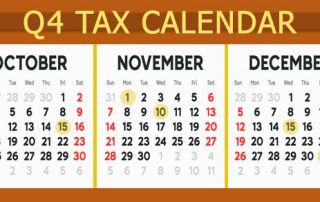Blog
2021 Q4 Key Deadlines for Businesses and Employers
Here are some of the key tax-related deadlines affecting businesses and other employers during the fourth quarter of 2021. Keep in mind that this list isn’t all-inclusive, so there may be additional deadlines that apply to you. Note: Certain tax-filing and tax-payment deadlines may be postponed for taxpayers who reside
Additional IRS Guidance for COBRA Assistance Under ARPA
In Notice 2021-46, the IRS recently issued additional guidance on the COBRA premium assistance provisions of the American Rescue Plan Act (ARPA). Under the ARPA, a 100% COBRA premium subsidy and additional COBRA enrollment rights are available to certain assistance eligible individuals (AEIs) during the period beginning on April 1,
Is it time to upgrade your accounting system?
Timely financial data is key to making informed business decisions. Unfortunately, it’s common for managers to struggle with their companies’ accounting systems to get the information they need, when they need it. Often, it takes multiple, confusing steps to enter and extract data specific to customers and/or projects. Businesses and
Tenancy-in-Common Can Help Estate Planning
If your estate includes significant real estate investments, the manner in which you own these assets can have a dramatic effect on your estate plan. One versatile estate planning option to consider is tenancy-in-common (TIC) ownership. What is tenancy-in-common? A TIC interest is an undivided fractional interest in property. Rather
New Rules Coming for Taxation of Cryptocurrency and NFTs
Cryptocurrency, a type of digital currency that uses cryptography for security and anti-counterfeiting measures and is not controlled by any bank or government, is becoming more mainstream as more companies and individuals use it. Now, new ways to regulate and tax it are on the table, including the proposed Infrastructure
Properly Report Business-Related Travel and Entertainment Expenses
Many companies have resumed some level of business-related travel and entertainment (T&E) activities — or they plan to do so this fall. Unfortunately, these expense categories may be susceptible to incomplete recordkeeping and even fraud. So, it’s important for companies to implement formal T&E policies to ensure reporting is detailed
Updated Lease Standard Deadline Quickly Approaching for Private Companies
Updated accounting rules for long-term leases took effect in 2019 for public companies. Now, after several deferrals by the Financial Accounting Standards Board (FASB), private companies and private not-for-profit entities must follow suit, starting in fiscal year 2022. The updated guidance requires these organizations to report — for the first
Annual Exclusion for Gifts
As we approach the holidays and the end of the year, many people may want to make gifts of cash or stock to their loved ones. By properly using the annual exclusion, gifts to family members and loved ones can reduce the size of your taxable estate, within generous limits,
Sick and Family Leave Reporting Guidance
The Treasury Department and the IRS have issued Notice 2021-53, which provides guidance to employers about using Form W-2 to report the amount of qualified sick and family leave wages paid to employees for leave taken in 2021. This is welcome news for many taxpayers, as this guidance covers the Families
Claiming the R&D Tax Credit the Right Way
Seth Knighton, Senior Tax Accountant Grand Junction Every year, the IRS releases the "Dirty Dozen," a list of tax scams and schemes on which the agency chooses to focus. In the crosshairs this year is the abuse of business tax credits. The IRS explains, "improper claims for the










